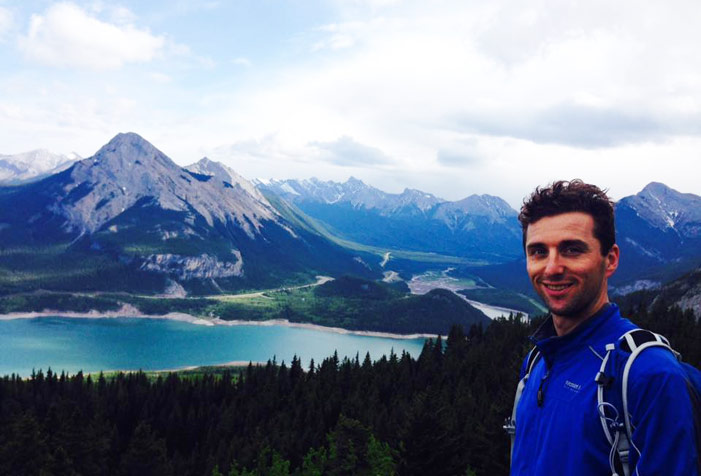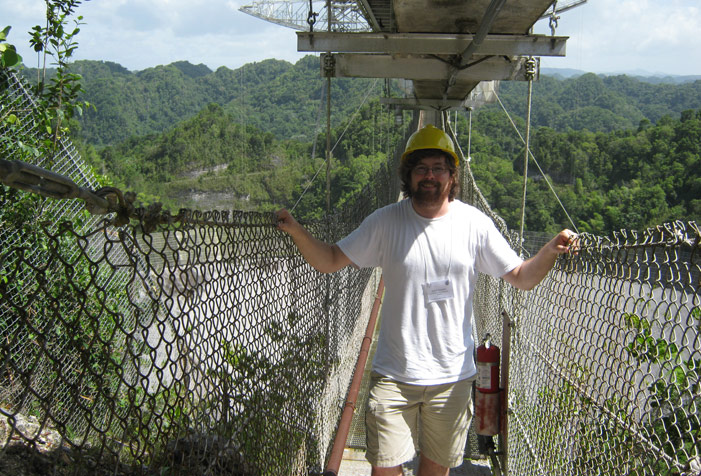Two members of the UNB community win international young scientist awards
Author: Communications
Posted on May 5, 2017
Category: UNB Fredericton
University of New Brunswick alumnus Dr. Chris Watson and UNB PhD candidate David Themens have each won a prestigious international award for their research of the upper atmosphere in the Canadian Arctic.
Both recently found out they will be receiving the Union of Radio Science Young Scientist Award.
The Young Scientist Awards will be presented at the General Assembly of International Union of Radio Science this summer. The awards recognize an international group of individuals who have made innovative contributions and discoveries in multidisciplinary research related to electromagnetic fields and waves.
“Chris and David are both outstanding researchers. They have dedicated their academic and professional careers to expanding our knowledge and understanding of the ionosphere,” said Dr. P. T. Jayachandran, chair of physics department at UNB’s Fredericton campus.
Both researchers have focused their work on the atmosphere and ionosphere of the Canadian Arctic and the effects of solar storms on satellite and radio communications in that region. While they work in similar fields, the awards recognize their achievements individually.

Dr. Watson, who works in Boulder, Col. at the University Corporation for Atmospheric Research, noted that the unique nature of his research may have contributed to the awards committee taking notice of his work.
The awards will recognize his work with the GPS Attitude, Positioning, and Profiling Experiment occultation receiver, also called the GAP instrument, one of eight tools on board the Canadian Space Agency’s CASSIOPE satellite.
The GAP instrument is designed for observations in the Arctic region and allows researchers to study the effects of space weather on the ionosphere.
“Previously, observational capabilities in the Arctic were limited, but through new scientific instruments, we are able to collect more data and make new and unique observations in this region,” said Dr. Watson, who completed his bachelor of science, master of science and PhD in Physics at UNB.
He added that natural resource exploration, military presence and the desire to open new aviation routes in the Arctic are helping to drive interest this region and this type of research.

Mr. Themens, a PhD candidate in physics at UNB who will defend his thesis later this year, has been working to develop a new model of the ionosphere. He said the ionosphere can act like a mirror for high-frequency signals, allowing for long-range communications. But it can also slow signals and lead to errors in navigation systems, such as the Global Positioning System.
“In order to correct for these errors, accurate models of the ionosphere are necessary,” said Mr. Themens, who earned his bachelor of science degree at UNB in 2011. “That’s why I have developed a model of the ionosphere called the Empirical Canadian High Arctic Ionospheric Model. This state-of-the-art empirical model is capable of representing one of the most complex and dynamic regions of the upper atmosphere, even during strong geomagnetic storms.”
As recipients of the 2017 award, Mr. Themens and Dr. Watson will attend the International Union of Radio Science General Assembly and Scientific Symposium in Montreal in August to present their research.
“I put a lot of hard work into this research. It’s great to have my work recognized and this is an exciting opportunity to showcase my research on an international stage,” said Dr. Watson.
Mr. Themens said that winning this award as a student means a lot to him and he is looking forward to taking part in the general assembly and symposium.
“The most exciting part is the opportunity to share my work. I love doing research in this field and nothing makes me happier than to share and develop research with others in my field,” said Mr. Themens.
This is the second time Mr. Themens has received this award. He also won the young scientist award in 2014, earning a spot to present at the International Radio Science Atlantic Conference in the Canary Islands that year.
Both of them credit their success to their time at UNB, access to undergrad research opportunities and studying under Dr. Jayachandran.
“Dr. Jayachandran gave me the opportunity to install scientific instruments in the Arctic region, which I eventually used to collect data to complete both my masters and PhD,” said Dr. Watson. “He also helped me secure funding to attend international conferences and present my research. Those experiences are why I’ve continued on with this research.”
“He is an excellent supervisor, who’s allowed me the freedom to explore and develop my own theories while keeping me grounded and giving me direction when I need it most,” added Mr. Themens.
Media contact: Melissa Wah
